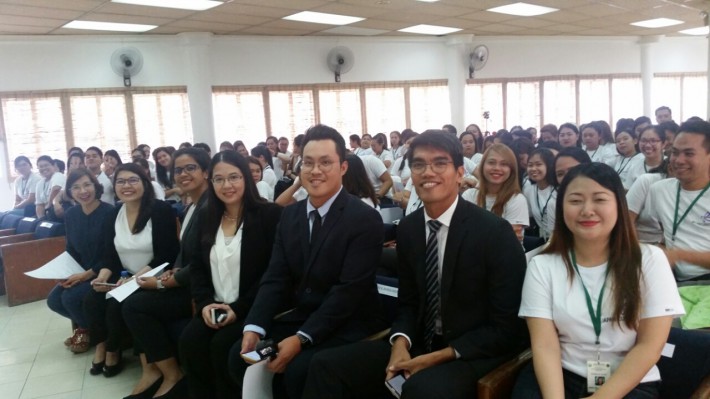On May 19, 2017, the 9th batch of Filipino nurses and certified care workers completed their preparatory Japanese language training at the Nihongo Center Foundation under the Philippines-Japan Economic Partnership Agreement (EPA). With a closing ceremony held at the President Jose P. Laurel Memorial Hall of the Philippines-Japan Friendship Center in Manila, the 6-month long program successfully produced 315 graduates. Other participants finished their training at TESDA and the Personal Ability Development Foundation (PAD), two other partner institutions for the training program organized together with the Japan Foundation Manila Office (JFMO).
In his opening remarks, JFMO Director, Mr. Hiroaki Uesugi not only gave his sincerest appreciation for the participants’ positive participation and determined efforts, but also thanked the energetic and ceaseless efforts and teamwork of the lecturers and staff members who made sure that the program was at its best. He also encouraged the trainees to think positively and hoped that they will overcome the challenges they may face once they start living, studying, and working in Japan.
Honorable guests Mr. Philip B. Sanvictores, NCF President; Mr. Roberto L. Larga, Director IV, Welfare and Employment Office, P.O.E.A; and Mr. Manabu Yasukawa, First Secretary, Labour Attaché, Embassy of Japan all gave their congratulatory remarks during the program.
“This is probably the very first baby steps that you will be taking in your journey of learning Nihongo.” said Mr. Sanvictores. He continued:
“When you start off in Japan, please remember that you have a role to play. First you have to be good workers. Secondly, you have to recognize that you are also representing our country, our people, and our soul as Filipinos and our reputations. Please be careful to make sure that the Japanese, your superiors, your patients, the people you work with – they will all be blessed through you because you are doing your job well and the fundamental foundation of that will be language. That is why this is a unique opportunity for each and every one of you to make that step in to a new environment where you are actually going to be a blessing.”
Mr. Manabu Yasukawa commended the participants for their hard work and dedication and echoed the message of the NCF President about the importance of language, specifically mentioning self-discipline and its role in language learning:
“I would like to emphasize the importance of self-discipline in learning the language. We may give you long and intensive training, but without self- discipline, retention might be difficult. You must continue to study everyday even after the training which you will have in the coming months in Japan.”
To address the apprehensions of the graduates about being away from loved ones and being in a different environment, Mr. Yasukawa encouraged them to look at it from another perspective.
“Take advantage of this opportunity to enjoy the sights, food, festivals, and the varied seasons of Japan. Learn about its culture, and build lasting friendships with the people you will meet there. I believe the Japanese are very kind, surely they will appreciate the friendship you will extend to them. I am also certain your respective employers, patients, and caregiving facility residents are looking forward to meeting you and experience the distinct care of Filipinos.”
After the congratulatory remarks, Mr. Uesugi presented the Certificate of Completion to the class representatives and was followed by a message from Ms. Mary Ann Borja, Representative of the Candidates.
To further give support and encouragement to the Japan-bound health workers, Head Leacturer, Josef Carlo Orillo-sensei recalled the first few months of their training:
“At the start of your training, I talked about how a common language becomes a bridge between people of different countries. It is a medium for the sharing of ideas and feelings, a method by which we can learn that despite our differences – the gap of cultures and nations – we all share the same basic needs and wants, thoughts and passions as people.”
For the next months to follow in Japan, he encouraged the trainees to keep on improving their Nihongo:
“Having completed your training, you now have this bridge, this tool for connecting with another person. When you go to Japan, use it, practice it, improve more and more, not only for your work and the eventual goal of passing the licensure exam, but also enrich your relationships with your co-workers and friends.”
The successful trainees will continue another six months of training at a Japanese language institute in Japan before finally getting assigned to hospitals and caregiving facilities all over the country. After building up on their experiences, the nurse and care worker candidates will be required to take the Japanese national examination for nurses or certified care workers, based on which their work in Japan would continue.
===========
Related Resources:
Speech by Mr. Manabu Yasukawa, First Secretary, Embassy of Japan
Speech by Mr. Philip B. Sanvictores, NCF President
Speech by Josef Orillo Sensei, Head Lecturer
Speech by Mary Ann E. Borja, EPA Candidate
Opening Remarks by Mr. Hiroaki Uesugi, JFMO Director
Photos – Closing Ceremony, 9th Batch of EPA Graduates




